PHield Innovation Lab (PHIL)
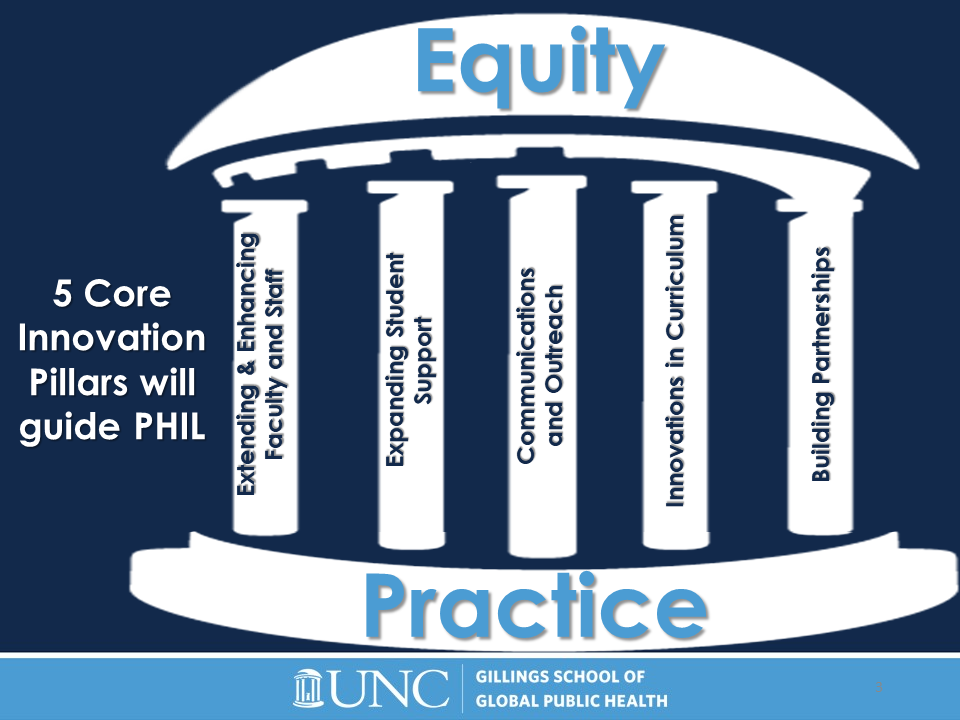 In Spring 2022, PHLP launched the PHield Innovation Lab (PHIL). PHIL is working with faculty, staff, and students to provide a structure to help implement and manage PHLP innovation ideas. In the Summer of 2022, PHIL was able to fund 12 student practicum opportunities with community organizations this summer, which helps PHLP strengthen our community partnerships while supporting students’ work with a stipend during their practicum.
In Spring 2022, PHLP launched the PHield Innovation Lab (PHIL). PHIL is working with faculty, staff, and students to provide a structure to help implement and manage PHLP innovation ideas. In the Summer of 2022, PHIL was able to fund 12 student practicum opportunities with community organizations this summer, which helps PHLP strengthen our community partnerships while supporting students’ work with a stipend during their practicum.
Learn more about the work PHIL-funded students have been doing (PDF).
Practicum Experience Spotlights
Hear about Amanda Kwong’s Experience
“I am in the Leadership in Practice concentration as an MPH@UNC student. I work full-time as a Campaign Manager at the Ad Council in Washington D.C., a nonprofit organization that produces, distributes and promotes public service announcements. When looking for a summer practicum, I had to make sure the opportunity provided me with a thorough understanding of public health best practices (since I am currently trained as a marketing and advertising professional) while also continuing to balance this opportunity with work and school.
I was lucky enough to be placed with the North Carolina Institute of Public Health (NCIPH), part of the Gillings school that leverages faculty to support best practices for health-adjacent institutions in North Carolina. It provides training and professional development courses, conduct community assessments, and provides leadership development courses. I had John Wallace as my preceptor throughout the duration of the program. I also got to interface with a few other folks on the team, a few of whom also received their MPHs degrees from the Gillings School of Global Public Health. From my first meeting with the team, I knew this was the practicum site where I wanted to spend my summer.
During my practicum, I supported the development of a Community Health Needs Assessment (CHNA) for the Mahoning and Trumbull counties in Ohio. This CHNA aimed to identify underserved populations and the unmet needs of these communities to guide stakeholders toward prioritizing available resources to meet these needs. I had the pleasure of working on two distinct projects. One was to assist with the development of CHA and CHIP reports. The other was to develop public-facing fact sheets about the CHA/P findings. It was exciting to see processes I had been exposed to in my previous semesters, as well as my current semester (I was enrolled in SPGH 791: the Leadership in Practice course taught by Dr. Sharon Loza). For example, when we were working on the Community Health Improvement Plan (CHIP) in late July, around that same time, I was learning about Turn the Curve thinking, a results-based accountability exercise. This activity serves as a natural step following the CHNA, to help ground key stakeholders and community members on the action plan following the CNHA. It was extremely gratifying to make connections between class and practicum and see it play out in practice. Working as a student assistant this summer at NCIPH was a terrific experience and reinforced my growing passion and commitment to growing my leadership in the public health community.”
Hear about Sara Moreno’s Experience
“This summer I worked with the North Carolina Institute for Public Health to create a Community Health Assessment (CHA) Toolkit/Framework for their Community Assessment and Strategy Team. This toolkit helped serve as a knowledge-sharing platform for NCIPH to conduct CHAs more efficiently by outlining the Institute’s internal processes, best used practices, timelines, roles, responsibilities, and resources. During this process, I worked with the different groups within the Community Assessment and Strategy Team to collect the aforementioned data. I really enjoyed the process of working with the different teams to create the framework where everyone brought their ideas to the meetings, and we were able to collaborate. We were able to create a toolkit that was adaptable to different CHA’s needs and that incorporated the team’s ideas. By creating the CHA toolkit, I was able to draft a proposal for a Duke Endowment to be able to scale up part of the toolkit which would give local health departments access to knowledge and resources on how to collect, analyze and interpret primary data to be able to better identify priority populations in need of help, which tend to be historically excluded populations. By identifying these populations, the counties will be able to create a more effective and inclusive CHIP.”
Hear about Emma Landau’s Experience
“This summer, I worked with the community assessment strategy team for the New Hanover community health needs assessment for the North Carolina Institute for Public Health (NCIPH). With my preceptor, I attended and took notes for all of the community conversations, which happened in various places in New Hanover County and consisted of various groups of priority populations. From the notes, I created summary sheets which were reviewed and shared to the citizens of New Hanover County.
The second part of my practicum consisted of writing a section of the community health assessment report. I researched history, analyzed data, then created the district profile section of the report.
Overall, this was a great experience and really helped me advance in my public health knowledge. This practicum was integral in assisting me to find my place within the public health field.”
Hear about Maggie Cremin’s Experience
“I completed my practicum with the North Carolina Institute for Public Health, which oversees the North Carolina Local Health Department (NCLHD) Accreditation Program. The NCLHD Accreditation Program seeks to assure and enhance the quality of local public health in North Carolina by promoting the implementation of activities for local public health departments and evaluating and accrediting local health departments on their ability to meet those activities. The NCLHD Accreditation Program staff provides resources and consulting to support all of North Carolina’s local health departments in meeting the state’s accreditation guidelines. Maintaining accreditation is an ongoing cycle with each department completing the reaccreditation process every four years.
My practicum included two specific deliverables: a resource guide to inform phase 3 strategic plan objectives and next steps, and a communication plan to solicit local health departments’ feedback on accreditation program revisions. The resource guide compiles phase 1 strategic plan feedback, Accreditation Administrator comments, and crosswalks with national public health frameworks. It also includes draft recommendations for phase 3 program revisions. The resource guide is used by NCLHD Accreditation Program staff and a Standards Workgroup composed of accreditation program participants and local health department staff. The purpose of the communication plan is to reach the largest number of accreditation program participants to receive the broadest input, and particularly target subgroups who may have had low response rates in the past. This information will be used to inform how the NCLHD Accreditation Program staff proceeds in implementing phase 3 of its strategic plan.
Through my practicum experience, I applied leadership, governance, and management principles by organizing our twice-monthly meetings, preparing materials for the workgroup’s review, facilitating meetings, and tracking and revising recommendations in a resource guide. In addition, I gained more insight into the daily operations, public health programming, and opportunities for improvement in local health departments in North Carolina. I also learned best practices and methods for broad survey distribution and high survey response rates and how to adapt those methods to the local health department setting.
I will continue supporting the NCLHD Accreditation Program’s phase 3 strategic planning through the 2022-2023 academic year. I look forward to continuing my work with the Standards Workgroup to implement meaningful change in the NCLHD Accreditation Program, so it provides more value to local health departments and helps them be better prepared to respond to public health needs in their communities.”
Governor’s Crime Commission Practicum
Hear about Mikayla Welch’s Experience
“For the duration of my practicum, I had the privilege to work with Dr. VanDeinse as my preceptor, a Research Associate Professor at UNC-CH School of Social Work, on an interdisciplinary team from the UNC-CH School of Social Work and the UNC-CH Gillings School of Global Public Health contracted by the Governor’s Crime Commission (GCC) to complete a comprehensive assessment of service needs for victims of crime in North Carolina. This needs assessment focuses on services needed by and available to victims of crime in the state with the ultimate goal of providing recommendations to the GCC on how best to improve services and service access. For this study, the GCC is specifically focusing on victims of crime in underserved populations. The data collection for this assessment will include an organizational survey of crime victim services providers and culturally specific organizations, a web-based resource inventory, semi-structured interviews of victim service providers and advocates, and a survey of victims of crime. I had the opportunity to assist with the data collection and analyses on the interviews with service providers and advocates and draft a preliminary report to effectively communicate the key findings back to the team, and eventually to the GCC.
During my time on the team, I had the opportunity to expand on my current skills and gain new ones that will be essential to my future success in the Public Health Field. I had the opportunity to explore different rapid qualitative analysis approaches to determine the best option for the project and gain new skills in creating the qualitative analysis tools necessary to complete data collection and analysis. I was also able to focus on growing my leadership and program management skills by making decisions on the qualitative data process, delegating tasks amongst the team, and assisting with facilitating meetings. Through completing these tasks, I had the opportunity to learn different program management software and techniques in order to ensure the project remained on track with the timeline I created. My practicum experience did not go without challenges as my team, and I was forced to change and adapt approaches, timelines, and deliverables multiple times in order to be more effective in our assessment. Flexibility and adaptability are crucial skills for Public Health professionals as we must be ready to face challenges and constant change, and this practicum has provided me with experience in just that.
Since completing my practicum with this team over the summer I have been asked to remain on the team as a Research Assistant for the GCC project. This has granted me the opportunity to continue to expand my leadership skills with more project management responsibilities while also continuing to assist with the qualitative analysis and creation of different deliverables for the GCC and distribution to the community.”
Smart Start and North Carolina Partnership for Children Practicum
Hear about Madeline Stutz’s Experience
“My practicum experience was hosted by Smart Start and North Carolina Partnership for Children based out of Raleigh, NC. Smart Start is a non-profit organization that works to increase the quality of education, support families, advance child health, and expand literacy in counties across North Carolina using public health skills and practices. During the onboarding period, my preceptor and I discussed that my practicum products would focus on nutrition, outdoor learning, physical activity, and Technical Assistance Providers (TAs) capacity. The TAs of Smart Start partake in a wide variety of responsibilities, such as implementation, communication, teaching, and connecting the organization, stakeholders, and resources.
My first practicum product focused on the importance of framing public health issues appropriately to stakeholders and recommendations for integrating nutrition and outdoor learning into early childhood care settings. Since Smart Start employees come from diverse educational backgrounds, this product aimed to explain the significance of framing and putting context to public health problems.
My second practicum product concentrated on building the capacity and growth of all TAs in the organization, specifically regarding nutrition, physical activity, and outdoor learning, by creating a data collection tool to interview TAs. TAs have a wide range of responsibilities; therefore, the data collection tool is diverse in its application and can be used as a foundational tool to build on.”
NC State’s SNAP Education Program Practicum
Hear about Alexa Moberley’s Experience
“I worked with NC State’s SNAP Education program called Steps to Health, which promotes healthy eating behaviors and food resource management strategies to youth, adults, and communities. The program collaborates with organizations in the community to expand access to healthy food and physical activity in the community. The goal of SNAP-Ed is to improve the likelihood that a person eligible for SNAP will make informed healthy food choices and choose a physically active lifestyle on a limited budget. I worked on two projects this summer: one was the creation of a toolkit for NC State Cooperative Extension agents across the state of North Carolina that can use for individuals in their community that are in a transitional living situation, whether that be sheltered or unsheltered. Sheltered homeless is when someone lives in an emergency shelter, domestic abuse housing, RV, etc. Unsheltered homeless is when someone is seeking shelter in a place that is not ordinarily used for shelter, such as a park bench or in a tent under a bridge. The goal of this toolkit is to provide NC State Family and Consumer Science Program Agents with accessible information and evidence-based resources to enhance the lives of individuals in transitional living. The information here addresses best practices, common challenges for this population, frequently asked questions, and additional resources. Secondly, I worked on another project at The Galley food store in Raleigh, NC. The Galley grocery store was created by the Ship of Zion church in 2014 to provide low-cost groceries in the South Park, Raleigh area. This area was considered a food desert due to the lack of transportation and that the closest grocery store at the time was 6.7 miles away. This food store initially started as a ‘corner food store’ and served hot dogs and sodas. When Steps to Health partnered with The Galley a few years ago, the goal was to put healthier food and beverage options in the store. Over the summer, I helped The Galley move their items to their new location, assisted with the implementation of an on-site garden, improved their nutrition inventory, organized shelving, and set up nutrition education materials.”
Chatham Health Alliance Practicum
Hear about Maddie Roberts’ Experience
“This summer, I had the opportunity to work as a public health intern with the Chatham Health Alliance. The Chatham Health Alliance (the Alliance) is a collaboration of local professionals and community members working together to improve health and well-being in Chatham County. The mission of the Alliance is to bring together traditional and nontraditional partners to work on issues affecting health in Chatham County, with a primary focus on the health priorities identified every three years in the Community Health Assessment. Per the 2021 Chatham County Community Assessment, Alliance members are currently focusing on the following health priorities: mental health and substance abuse, transportation, and employment. The vision of the Alliance is an active, thriving community for Chatham County where all residents achieve optimal health. Throughout my practicum, I was glad to work with the Alliance to complete the following tasks:
- Developed an NCCARE360 pilot program implementation plan for Chatham County.
- Launched in 2020, NCCARE360 is the first statewide network in North Carolina linking health care and human services providers to one another with a shared technology platform. When properly implemented and utilized within a community, NCCARE360 connects healthcare providers, social services, and patients on a platform that prioritizes whole person-centered care. As of June 2022, Chatham County is one of the lowest-performing counties utilizing the Unite Us NCCARE360 platform within an 18-county region. Recognizing the potential for greater utilization of NCCARE360, Alliance leadership asked me to develop a pilot program implementation plan to increase the utilization of the NCCARE360 throughout Chatham County. Developing the implementation plan required me to talk with partners who are integral to the success of NCCARE360 in Chatham County, research and understand existing barriers to NCCARE360 within Chatham County, and analyze county- and regional-level data. The implementation plan compiles all that I learned this summer and provides Alliance staff with the information and resources needed to successfully implement the pilot program. Some primary goals of the implementation plan are to inform Alliance staff on the purpose of NCCARE360, identify why NCCARE360 is underutilized in Chatham, establish realistic outcomes for the pilot program, communicate with pilot program participants, provide recommendations for program success, and more.
- Identified grant opportunities and submitted grant proposals related to Chatham Health Alliance capacity building and Resource Hub growth.
- In May of 2022, the Alliance became an independent nonprofit, allowing them to seek out grant opportunities. Throughout the summer, I researched and compiled 20 viable grant applications and applied to two. If funded, the two grants will support internal strategic development and the Alliance’s Community Resource Hub.
- Supported administrative tasks within the Alliance, such as membership engagement, meeting facilitation, and strategic development.
- Finally, this summer I was able to provide administrative support to the Alliance. Primarily, I was able to work closely with each Alliance subcommittee as they established their action plans based on the top three health priorities identified within the Chatham County Community Assessment.
I am so grateful for the opportunity to have worked with the Alliance this summer, and I’m eager to remain involved in the work they’re accomplishing throughout Chatham County. Finally, thank you to the PHield Innovation Lab team for the role they played in providing funding for my practicum experience!”
Population Health Improvement Partners Practicum
Hear about Ashleigh Olin’s Experience
“My practicum was completed with Population Health Improvement Partners. I spent about 3 months working with my preceptor, Trissa, and the rest of the team. The work they focus on is using quality improvement tools to help other organizations reach bigger goals. I was able to complete two products while conducting my practicum: an infographic that included the facilitators the partners used to not only get their work done, but to deal with the stress that comes with their work, both in their field and in their personal lives, also, a PowerPoint that included a compilation of common quality improvement tools used often in their work.
I truly appreciated and was so grateful to have a preceptor like Trissa. We met every week and kept a consistent and effective line of communication going when it came to the meetings, deadlines, and products. She was very hands-on and super involved with the work I had to do in addition to her work. She made this practicum feel more like a pleasure rather than “work,” from the conversations we had to the grace she gave me with getting the work done and just being understanding of whatever I had going on. The rest of the team was very cooperative and receptive to me and the work I was trying to do, and they made the time to meet with me when it came down to me conducting interviews for my products we had very good conversations as well and I appreciate them for providing me with a comfortable, free space to ask the questions I needed to ask.
Throughout my practicum, I was able to see how close and tight-knit a team Population Health Improvement Partners are and how I think any other organization can learn from them, but also allow them to help with their goals and issues and I truly enjoyed completing my practicum there.”
Bounty and Soul Practicum
Hear about Michael Ratliff’s Experience
To fulfill the requirements of the 2023 summer practicum assigned for the UNC Asheville-UNC Gillings Master of Public Health (MPH) Place-Based Health Concentration I joined with Bounty & Soul – a community-driven, food justice nonprofit located in Black Mountain, NC. Bounty & Soul distributes fresh produce and other nutritious foods to Western North Carolina residents via three weekly markets or by delivery, and also operates within the NC Medicaid Healthy Opportunities Pilot. To help realize the objectives set by Bounty & Soul’s Rooted in HealthTM (RiH) program (e.g., health and wellness education, cooking demonstrations, and written educational materials/resources) I collaborated in the development of Bounty & Soul’s 2023 Rooted in HealthTM – Culinary Medicine Survey, facilitated listening sessions for market participants (including generating listening session transcripts), and developed a community-informed nutrition/resources booklet. Through these methods and by regularly engaging with market participants during the organization’s Tuesday and Friday markets, I was able to craft deliverables that were curated specifically to those who engage with Bounty & Soul markets.
- The skills used in supporting Bounty & Soul’s health and wellness education involved:
- the development, distribution, analysis, and data visualization of 423 returned Rooted in HealthTM surveys
- the preparing and leading of Rooted in HealthTM cooking demos for market participants (including printed materials and recipes with Spanish translations)
- the facilitation of two market participant focus groups, including the preparation of listening session discussion points and transcription of focus group dialogue into a document
- the development of a WNC community-first, literature-informed nutrition education and health resources booklet for host organization (due to its length, this document is submitted but is currently being reviewed and revised alongside Bounty & Soul members)
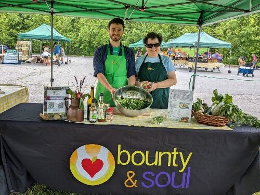
Source: Bounty & Soul.
In order to fully actualize the goals of my practicum I regularly collaborated with WNC community members, and with the organization’s executive and associate directors and its Community Engagement, LatinX Program, Food Distribution and Farmers Alliance staff. For the purposes of developing future partnerships between MPH preceptees and preceptor organizations, I interviewed Bounty & Soul’s executive director Ali Casparian to learn why B&S chose to partner with MPH students and the benefits in doing so, along with learning about other local nonprofits with potential to precept future students.
RACE for Equity Practicum
Hear about Lexi Hartanft’s Experience
My practicum experience hosted by RACE for Equity was an enlightening journey that allowed me to immerse myself in the organization’s mission of advocating for equity at the core of various entities working towards improving the lives of their served populations. Throughout my time with RACE for Equity, I had the privilege of actively contributing to their results-driven approach, deeply rooted in the Results Based Accountability™ framework. Engaging with the organization’s emphasis on data-driven decision-making, I transcribed and analyzed focus group interviews, extracting salient themes that formed the foundation of comprehensive summary reports and presentations. This process highlighted the importance of centering community members’ lived experiences in every step of the decision-making process. The organization’s commitment to fostering cultural responsiveness and leadership capacity was evident as I collaborated with community partners, delivering research findings that bridged the gap between data and actionable change.
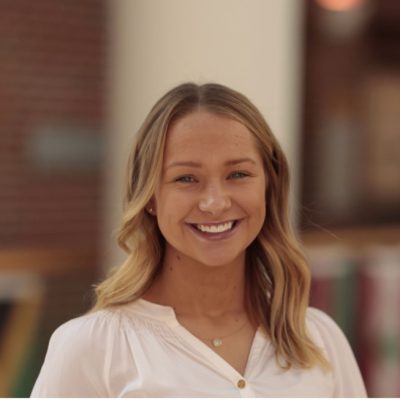
Lexi Hartanft
In tandem with my analytical contributions, I also had the opportunity to harness my creativity in spreading awareness about RACE for Equity’s mission. Crafting and executing social media implementation plans allowed me to generate compelling content aligned with the organization’s guiding principles. Through these efforts, I was able to contribute to the expansion of RACE for Equity’s digital footprint, reaching a wider audience and fostering meaningful connections with individuals and communities passionate about equity. My practicum experience not only enriched my understanding of the profound importance of equity in all spheres but also provided me with tangible skills in research, communication, and community engagement that will shape my future endeavors in promoting equitable change.
North Carolina Center for Health and Wellness Practicum
Hear more about Andrew Rainey’s Experience
“As a part of the UNC Gillings Master of Public Health (MPH) Place-based Health Concentration in Asheville, NC, I joined the North Carolina Center for Health and Wellness (NCCHW) to complete my place-based practicum in the mountains of WNC. In partnership with UNCA Faculty, Mountain Area Health Education Center (MAHEC) and community partner Asheville Buncombe Institute for Parity Achievement (ABIPA), I supported the NCCHW Culture of Results (CoR) team’s program evaluation of the Dogwood Health Trust (DHT) Community Health Worker (CHW) Chronic Disease Initiative. This evaluation utilized a mixed methods, Community Based Participatory Research and Action model with this network of community partners.
My support of the program included operating audio/video equipment for a series of interviews with CHWs and their clients, ad-hoc translation and interpretation on the community research team, crafting a focus group outline, writing interview transcriptions in English and Spanish in preparation for analysis, recommendations for an analysis methodology, creating a media guide to share results, and joining community researchers to analyze our process. To support partnerships further, I also interviewed members of the CoR team to create a list of recommendations for the Place-based MPH program to support the placement of future MPH practicum students into their community-based projects. After working with the NCCHW, I have joined their ranks as a temporary employee to support their analysis process and develop media to share the results of community health workers’ amazing work.”
Durham County Public Health Department Practicum
Hear about Cierra Sifford’s Experience
I had the opportunity to work with the Population Health Team at Durham County Public Health Department. During my practicum I had to fulfill two work products: 1) Recommendation report to prevent burnout in public health professions and 2) Engagement plan to utilize stakeholders to promote health equity for all Durham County Residents.
During my first product I decided to create a DCoPH Employee Engagement Survey that was sent out to eight members of the Population Health Team. The survey was anonymous and consisted of fourteen questions. I received four out of eight responses from the Population Health Team. The engagement survey was distributed via SurveyMonkey and asked questions pertaining to their current role within the Durham County Department of Public Health, experience with burnout, relationship with their coworkers and team lead, and choosing a recommendation that can help prevent burnout in public health professionals.
My second product consisted of creating an engagement plan. I was able to discuss with the Population Health Team about their current partners for “access to care”. After retrieving useful information. I was able to utilize their partners and stakeholders to create a stakeholder analysis and outline to inform and provide tools to the Population Health Team on how to prioritize their stakeholders during project planning and decision-making.
In all, I enjoyed working with the Population Health Team. DCoPH gave me an opportunity to see what all goes into being a public health professional and for that I am very grateful.
Hands on Peru
Hear about Kaitlyn Stubblefield’s Experience
This past July, Kaitlyn went to Peru and volunteered with one of our partner organizations, Hands on Peru. Hands on Peru (HOP) is a non-profit organization dedicated to fostering sustainable community development and empowerment in Peru. It was established with a goal of creating lasting positive change. HOP engages in a wide array of initiatives aimed at addressing social, economic, and educational challenges faced by local communities. The multifaceted approach they implement includes programs focused on education, healthcare, infrastructure development, and cultural preservation, all geared towards uplifting the lives of Peruvians across various regions. Through collaborative efforts with local communities, HOP implements projects that not only provide immediate assistance but also aim to build long-term self-sufficiency. From building a public health clinic to promoting eco-friendly practices and supporting local artisans, HOP’s holistic approach reflects a deep commitment to preserving the cultural heritage and improving the quality of life for individuals and families in Peru.
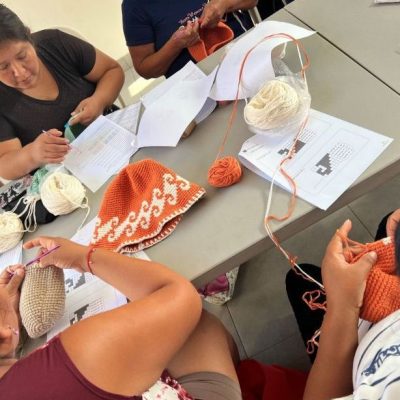
In this image, local mothers actively engage in their routine community program, ‘Madre Cesapu,’ diligently mastering a new pattern. These dedicated women from Chimuk have metamorphosed into skilled artisans, catalyzing a transformative journey that has significantly uplifted their lives. Through their craft, they’ve not only secured a respectable and dignified livelihood but have also embraced newfound skills while fostering a stronger sense of community. Discover their inspiring story in more detail here.
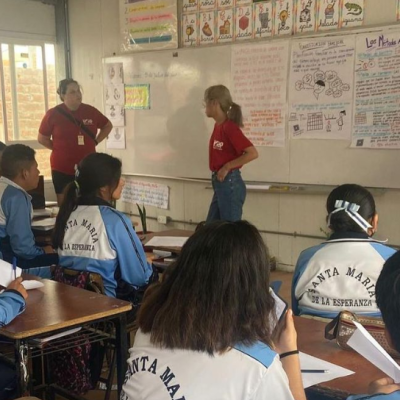
In this image, Kaitlyn and fellow volunteers from Hands on Peru engage in delivering sexual and reproductive health education at a Trujillo-based local school. This initiative is an integral component of Hands on Peru’s impactful ‘Yo Cuido Mi Cuerpo’ or ‘I Care for My Body’ program. Learn more about this work here.
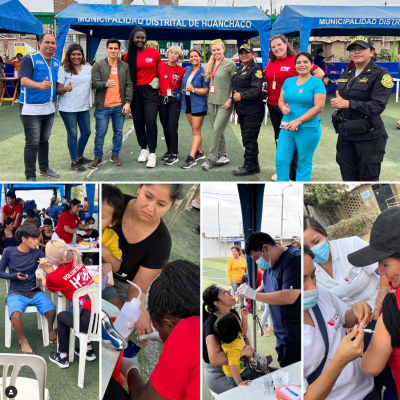
This event, conducted on the community’s soccer field from 9 am to 12 pm, showcased the teams collective efforts in offering an array of vital services. Over 100 community members benefitted from services provided at this event, including blood analysis, medical and dental consultations, nutritional guidance, eye examinations, flu vaccinations, chiropractic care, and haircuts, all provided at no cost. The event aimed to address essential health needs and foster well-being within the community. Learn more about the community work HOP is doing everyday here.
Interested in working with Hands on Peru? Reach out to Kaitlyn Stubblefield at krstubbl@unc.edu or reach out to info@handsonperu.org. There are opportunities to partner with HOP in-person and remotely.
